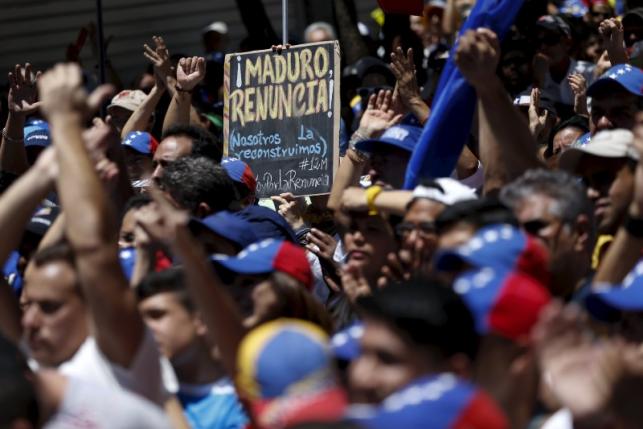Venezuela opposition has set up roadblocks and staged demonstrations demanding elections as the country’s political and economic crisis deepens.
Protesters responded with defiance to President Nicolas Maduro’s call for a new constitution to end unrest that has killed 28 people.
Nicolas Maduro said his move was necessary to fend off a foreign-backed plot against him.
The US said it was a bid to cling to power, while Brazil called it a “coup”.
President Maduro’s opponents want to hold a vote to remove him, blaming the left-wing president for food shortages that have led to rioting.
The president has rejected their calls and issued a presidential decree creating a 500-member “constituent assembly” to rewrite the constitution, a step that would bypass the opposition-controlled National Assembly.

Nicolas Maduro announced the step to thousands of his supporters at a May Day rally two days ago.
Elsewhere, security forces deployed tear gas and water cannon at anti-government demonstrators.
Opposition leaders have called for a “mega protest” on May 3.
Opposition leader Henrique Capriles tweeted: “People, into the streets!
“You must disobey such lunacy!”
There has been widespread international criticism of the move.
The head of the Washington-based Organization of American States, Luis Almagro, called it wrongheaded, unconstitutional and fraudulent.
The US state department spokesman Michael Fitzpatrick told reporters: “We have deep concerns about the motivation for this constituent assembly which overrides the will of the Venezuelan people and further erodes Venezuelan democracy.
“What President Maduro is trying to do yet again is change the rules of the game.”
Meanwhile, Brazilian Foreign Minister Aloysio Nunes called the move a “coup”.
“It’s another step in breaking the democratic order, which contradicts the country’s own constitution,” he said.
In Venezuela itself, in the opposition-controlled National Assembly, lawmakers voted to reject the new body with many saying President Nicolas Maduro was attempting to sideline the legislature and avoid new elections.
Nicolas Maduro was elected in 2013 to succeed the late Hugo Chavez, a popular figure who introduced wide-ranging social welfare programs.
However, since then, falling prices for Venezuelan oil exports have cut government revenue and there have been shortages of food, baby milk, medicine and other basics.
The IMF has forecast that inflation in Venezuela will be above 700% in 2017.
Presidential elections are due at the end of 2018.
https://www.youtube.com/watch?v=SDIVj3GpdtE
